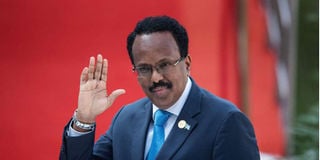Hefty poll fee ‘may lock out women and youth’

Somalia's President Mohamed Abdullahi Farmaajo.
What you need to know:
- The new timelines mean the country will almost stick to its electoral calendar of four years.
- A candidate for the Lower House of Parliament and Senate will pay $10,000.
The hefty amounts candidates must pay to be on the ballot paper in Somalia could lock out hundreds of women and youth, critics say.
President Mohamed Abdullahi Farmaajo and leaders of the federal states on Wednesday agreed to hold parliamentary and presidential elections from December to February 2021.
The new timelines mean the country will almost stick to its electoral calendar of four years.
Analysts, however, say the contest may largely be an affair of the well-to-do.
A candidate for the Lower House of Parliament and Senate will pay $10,000. During the elections in 2016, women candidates paid half what was demanded of their male counterparts.
The amounts have doubled and there is no special charge for women. However, the leaders agreed that 30 per cent of parliamentary representation should be female.
In the last elections in 2016 and 2017, a presidential candidate paid $30,000 to the electoral agency while a Senate hopeful was charged $10,000. Those interested in a Lower House seat paid $5000.
Opposition surprise
“The new fee is very high for many with political ambitions. It is a hindrance to women and youthful hopefuls,” political researcher Abdimalik Abdullahi told the Sunday Nation.
Women make up 24 per cent of the country’s bicameral legislature.
The 30 per cent quota decision came after pressure from donors and the United Nations.
Government officials argue that the charges are meant to lock out joyriders and people who may be sympathetic to al-Shabaab and other terrorist groups.
It is possible that the country could raise election budget from contenders. Somalia needs at least $50 million to conduct the indirect elections that will see clan elders nominate delegates who will then elect Lower House representatives.
Even seasoned politicians admit that the fees could discourage inclusivity.
Senator Ilyas Ali Hassan told the Sunday Nation that contenders from poor backgrounds may not realise their dreams.
“The calendar gives hope for remaining in our tradition of timely elections. But it is important that the vote involves all,” the Senator, who also serves as opposition Himilo-Qaran party’s Foreign Secretary, said.
The schedule says the selection of the delegates and their transfer to respective constituencies will take place between November 1 and 30.
Upper House
Members of the Upper House or the Senate will be elected between December 1 and 10 while those of the Lower House will be elected from December 10 to 27, a statement released after the meeting said on Friday morning.
The Lower House will have 275 MPs. Puntland will produce 37, Jubbaland (43), Southwest (69), Galmudug (37) and Hirshabelle 38. The remaining will come from Somaliland and Benadir region.
Mohamed Hassan Idriss, a Lower House representative from Jubbaland said incumbent MPs would easily meet the financial conditions but it would be difficult for new entrants.
The new calendar is also seen as a possible surprise to the opposition coalition Forum for National Parties FNP).
Led by former President Sheikh Sharif Ahmed and his successor Hassan Sheikh Mohamud, the FNP has not yet agreed on whether to field one contender for the coalition of six parties.
Idriss, however, said the alliance is ready for the elections.
Dispute resolution
The leaders also agreed to the form a dispute resolution committee to serve during the election period. The committee, they said, will be independent.
The leaders under the auspices of the National Consultative Forum said the committee will safeguard the integrity of the election modality, respecting the rights of voters and candidates and ensure fair and just settlement of complaints.
“The national conflict resolution committee, which will be formed just before the election, will comprise 21 members,” the statement released by Villa Somalia, the state house in Mogadishu, said.
It added that nine of the members would be nominated by the federal government while the remaining would represent the federal states.
“The committee will ensure the 30 per cent quota allocated to women in the legislative houses is observed,” the statement said.






